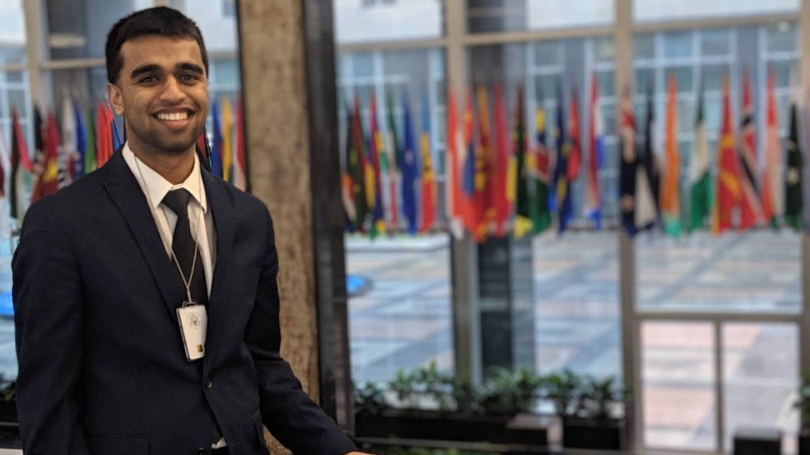
- Public Policy
- Leadership
- Funding
- News & Events
- About the Center
Back to Top Nav
Back to Top Nav
Back to Top Nav
Back to Top Nav
Soham Basu '20 interned at the Pakistan Desk at the U.S. State Department (SCA/P) during the 2019 winter term. The following is an excerpt from his internship report.
This winter, I worked on the Pakistan Desk at the U.S. State Department (SCA/P). The Pakistan Desk is housed in the Bureau of South and Central Asian Affairs and has four main teams: Political, Economic, Congressional Assistance, and Political-Military. My supervisor was on the political-military team and his portfolio covered counterterrorism. I worked closely with my supervisor but also with the congressional assistance, economic, and political team. It was an interesting time to be on the Pakistan desk, as the U.S. national security strategy was shifting past policy orientations away from Pakistan and towards India while at the same time negotiating a U.S. withdrawal from Afghanistan.
During my internship, India and Pakistan traded fire on the Kashmir border after a terrorist attack in Indian Kashmir. This major crisis led to a critical two-week period that saw U.S. diplomacy and leadership back the two nuclear armed countries away from further military escalation. Some of the projects that were highlights of my experience were: writing a National Day message signed and delivered by President Trump, writing a speech for the Under Secretary for Political Affairs, and note-taking during a meeting between Ambassador Alice Wells and Pakistani Political leader Bilawal Bhutto Zardari.
This internship lent me an understanding of national security in the U.S. government. I did not understand how enormous the U.S. national security domain is and more importantly the culture and style of each agency, how they function, what they do, and how they work together. Throughout my work I worked closely with members from the Department of Defense, the Department of Homeland Security, the Intelligence Community (which consists of 17 single agencies), Congress, and the National Security Council. Each of these institutions has its own culture, agenda, and style. It was enlightening in seeing how they work together and how the work subtly changes depending on where you are.
One of the biggest takeaways from this experience was the reaffirmation of my interest in South Asia and the ability to translate that academic and personal interest into a meaningful professional career. I witnessed firsthand how important my language skills and cultural understanding of South Asia as an Indian-American are to the U.S. national security domain. I also defined and found a topic for a senior government honors thesis that I will be pursuing next fall from this internship. I will be looking at how the Pulwama attacks affected the outcome of the 2019 Indian General Elections, and I have first-hand experience at State to now cite. Professionally, my colleagues also gave me a number of fellowships, scholarships, and programs to apply for including: Rangel, Pickering, Boren, Critical Language, FLAS, and more.
Moving forward, I’m dedicated to pursuing a career in national security with the U.S. government. This internship has given me an incredible advantage in knowing what I want to do and how to pursue it. The network I’ve created and the knowledge I have of how to navigate these spaces is invaluable. The Class of 1964 grant allowed me to participate in this internship with my full attention. I would not have had this experience without the Rockefeller Center, and I am extremely grateful for this opportunity.
The Rockefeller Internships Program has funding for Dartmouth undergraduate students to help defray the cost of living expenses associated with a full-time, unpaid, leave-term internships in the fields of public policy, public affairs, and social entrepreneurship.